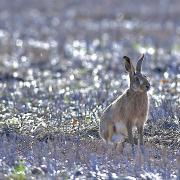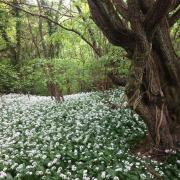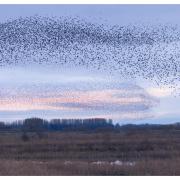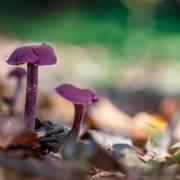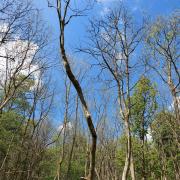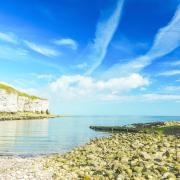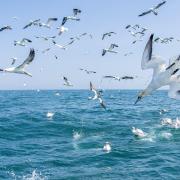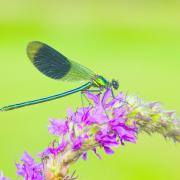A noise wakes you from your sleep – your alarm, coming from your plastic alarm clock. You get out of bed and put on your slippers, 100% polystyrene. You go down to the kitchen and grab the plastic milk bottle from the fridge for your cup of tea – even the teabag contains plastic.

It’s a universal truth that before most of us have even left the house in the morning, we will have already surrounded ourselves with plastic. Under cover of normality, it slowly seeped into every aspect of our lives.
On the whole we welcomed the takeover, or at the very least barely noticed it. Plastic milk bottles seem better than glass – they’re lighter, cheaper and don’t smash if you drop them. Surely an improvement, yes?
But it is a great irony that the very reason we once loved plastics is now the main reason we are trying to avoid them – their longevity.
Get a paper shopping bag wet and it basically becomes useless, but a plastic carrier bag can be used again and again, soaked in water and stretched by use yet remaining much as new. Realising this great positive we started to find plastic replacements for everything we could think of at incredible speeds, celebrating this new age of convenience until plastic lined our world like clingfilm over a sandwich.

WE’RE ALL AT SEA
If you design something to last forever, then you have a problem – your use for it will not outlast its existence. Long after it has left your consciousness forever, it will continue to live on wherever it ends up. Suddenly and powerfully, it became clear that one place where a lot of this non-biodegradable rubbish is ending up is our oceans.
This awareness started with drips and ended in a flood. For years, environmentalists and conservationists have been talking about the dangers of plastics as pollutants, and slowly more and more worrying stories and statistics started to appear in the media.
Then it felt like we simultaneously reached a tipping point – in the form of microplastics, trash islands and Blue Planet II. Microplastics are plastics which have degraded down as far as they can go, until they become so small they invade every element of the food chain like a virus. Giant trash islands form when swathes of plastics are brought together by the ocean currents, the largest of which is now three times the size of France. And Sir David Attenborough, with his unforgettable BBC series Blue Planet II, brought the severity of plastic pollution smack bang into our living rooms. The heartbreaking footage too real to ignore, we saw how plastic attacks the lives of sea creatures from outside and in; tangling round their bodies or being swallowed in place of food.
Our very perception of plastics altered – we no longer see our plastic bottle as a convenient vessel, or even an irritating piece of rubbish, but rather a dangerous pollutant that was threatening our precious marine life.

TURNING THE TIDE
But with alarm comes change, and people all over the world have begun to channel this aversion to plastics into various forms of direct action. Addressing the problem of plastic pollution can be done via two avenues: dealing with the pollution we already have, and stopping it from further increasing.
This is broadly how Yorkshire Wildlife Trust are organising their fight against plastic pollution. It’s now no secret that our seas are choked with plastic and, though much stays out at sea, some eventually makes its way back to our beaches, carried by the tides. The Waves of Waste project supports volunteers to take part in beach cleans across Yorkshire’s beaches. During every beach clean the litter collected is recorded and the results fed into a national database collected by the Marine Conservation Society and the information is analysed to determine trends.
In 2018, the results from 50 beach cleans along the Yorkshire coast revealed that plastic made up 69% of the litter found and 71% of that was small plastic or polystyrene pieces that are less than 2.5cm in size, the most dangerous to marine life as it is more likely to be mistaken for food.
The Trust has also created another project called Fishing 4 Litter which supports Yorkshire fishermen to understand the issues associated with marine pollution and promotes responsible disposal of fishing waste on land, and collection of litter found at sea. Participating fishing vessels receive hard wearing bags to collect litter as part of normal fishing activities and the full bags are then emptied into a dedicated bin or skip on the quayside or in compounds.
THE SOLUTION TO POLLUTION
There’s no denying that the problem of plastic pollution has reached critical levels, and when we examine our plastic-loving past this is hardly surprising. But there is also no denying that our very perception of plastics has dramatically shifted and we’re now set to start witnessing results. Trust-run beach cleans are more in demand than ever (there will be 60 this year), and every disaster news story we see is matched with another advocating action and change. Through decades of work, dedicated campaigners have begun to turn the tide on plastic pollution, and there is now hope that together we can bring our oceans back from the brink. u
To find out more and support the Trust’s work visit ywt.org.uk/wildlife/conservation-action/marine-conservation.








